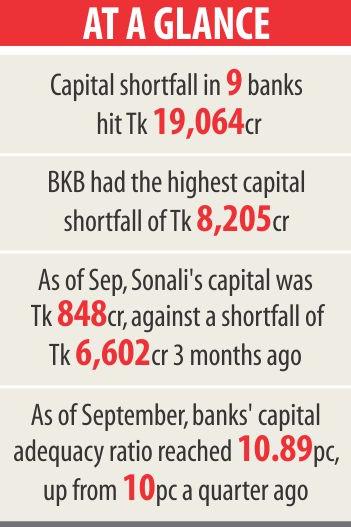Banks' capital rises, but artificially

The banking sector's capital base strengthened in the third quarter of the year as state-run Sonali Bank got a shot in the arm from the central bank as it exercised its 'regulatory forbearance' right.
Regulatory forbearance is a policy that allows the central bank to not take any disciplinary action against problem banks for a certain period of time to keep them afloat.
As of September, Sonali's capital base was Tk 848 crore, in contrast to a shortfall of Tk 6,602 crore three months earlier.
The state-run lender was given extra time of up to 3/4 years to keep the required provisioning in many cases against its defaulted and unclassified loans, said a Bangladesh Bank official.
Banks are required to maintain at least 11.817 percent capital adequacy ratio (CAR) -- which is a measure of a bank's financial strength expressed as a ratio of its capital to assets -- as per the roadmap set by the central bank to implement Basel III.
But when it came to Sonali, as part of its regulatory forbearance support, the banking watchdog disregarded the bank's provisioning requirement to some extent while calculating the required capital against its risk exposures. It is the provisioning requirement that burns a hole in a bank's capital base.
“This ultimately showed a strong financial health of the lender,” the BB official said.
In reality, the strong capital base of the bank is completely artificial as the improvement has mainly not stemmed from recovering the non-performing loans, he said.
As of September, banks' CAR stood at 10.89 percent, up from 10 percent a quarter earlier, according to data from the central bank.
In other words, despite the extraordinary support extended to Sonali, the banking sector fell short of maintaining the regulatory requirement.
Capital shortfall in nine banks, including six state-run ones, stood at Tk 19,064 crore at the end of September, up from Tk 18,541 crore three months earlier.
The banks are: BASIC, Rupali, Janata, Agrani, Bangladesh Krishi Bank (BKB), Rajshahi Krishi Unnayan Bank, Bangladesh Commerce Bank, ICB Islamic Bank and Social Islami Bank.
Of the nine banks, BKB had the highest amount of capital shortfall of Tk 8,205 crore, followed by Janata at Tk 3,923 crore, BASIC at Tk 3,434 crore and ICB Islamic at Tk 1,540 crore.
The state-run banks have been conducting their operation for long taking bail-out support from the government, which is not expected, said AB Mirza Azizul Islam, a former finance adviser to a caretaker government.
Such trend has created a “moral hazard” in the banking sector as other lenders may like to think that the government will extend the same support in the event of their capital shortfall.
Scam-hit Farmers Bank has recently got similar bail out from the state-run banks and a financial institution, which has not brought any good expression to the banking sector, he said. Since 2009, the government has injected Tk 14,505 crore into state banks but they are yet to show any sign of strengthening their capital base.
